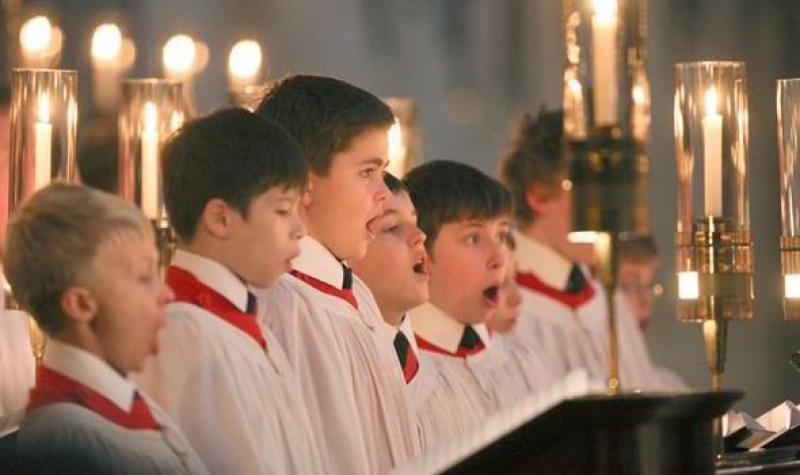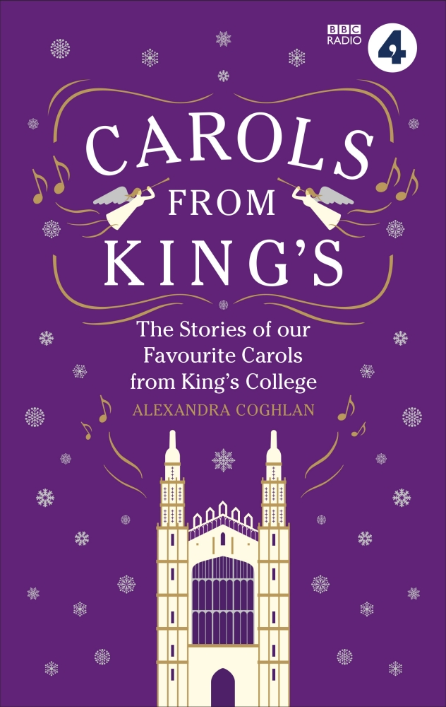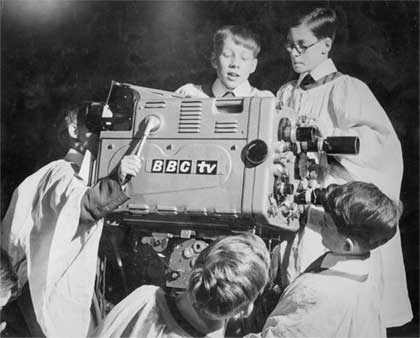Carols From King's: How a tradition was made | reviews, news & interviews
Carols From King's: How a tradition was made
Carols From King's: How a tradition was made
The pioneering BBC broadcast that first brought us Nine Lessons and Carols

For the first decade of its life, King’s Festival of Nine Lessons and Carols remained a local phenomenon, a “gift to the City of Cambridge”. But that all changed in 1928 with the first BBC Broadcast of the service. It wasn’t the first service to be broadcast from King’s Chapel, that honour goes to an Evensong in 1926, but it was the service that caught the imagination of a nation like none other before it.
Yet the service arrived in the BBC schedules without fanfare. A quick glance through the Radio Times for December 1928 finds only a small notice of the programme at the bottom of a page, tucked between advertisements for Bovril (“Increase Your Bovrility”), Veno’s Lightning Cough Cure, and Hovis (“Every Round a Square Meal”). It reads: “Christmas Eve, the day of carols, will be celebrated by carol singing from King’s College Cambridge, and from the churchyard of Whitechapel Parish Church.”
In 1930 no Christmas Eve service was broadcast from King’s – the only gap in an otherwise unbroken history of nearly a century.
The same surprisingly matter-of-fact tone can be found in the journal of Patrick Magee, the senior chorister of King’s Choir in 1928 and later a chaplain of the college, when he recalls this historic first broadcast. The thirteen-year-old Magee writes: “Christmas Eve. Practice 10-12.45. Go out to dinner with Mum and Dad. Carol service broadcasted. Comes off well. I read a lessons and sing a solo in ‘Lullay’.”
And yet the technical challenges of transmitting a service live from a space like King’s with its notoriously difficult acoustic must have been an almost impossibly ambitious feat in 1928, involving early Marconi-Reisz microphones slung on cables across the Chapel as well as fixed around the building. David Briggs, the only surviving chorister from that first Nine Lessons broadcast remembers, “One occasion where the crucifix actually collided with the microphone which was hanging from the ceiling”. But that, and all other issues, were calmly and efficiently dealt with by, “A chap called Mr Anderson, who used to come year after year from the BBC with a box of tricks that he would unpack in the vestry.” Indeed, it was the same Mr Anderson who ensured the successful broadcast of the service on the BBC for many decades to come.
 With one exception. In 1930 no Christmas Eve service was broadcast from King’s – the only gap in an otherwise unbroken history of nearly a century. Why the omission? Theories (conspiracy and otherwise) abound, but there are several plausible reasons for the gap. Perhaps the most likely involves the acoustic challenges of King’s itself – a theory supported by a BBC press release of 1958. “In 1929,” it reads, “there was no intention of putting it on the air every year; indeed difficulties with the acoustic militated against a complete radio success. In 1930 it was dropped by the BBC but next year the broadcasts were resumed – the awkward acoustics which give King’s some of its special characters having been got under control.”
With one exception. In 1930 no Christmas Eve service was broadcast from King’s – the only gap in an otherwise unbroken history of nearly a century. Why the omission? Theories (conspiracy and otherwise) abound, but there are several plausible reasons for the gap. Perhaps the most likely involves the acoustic challenges of King’s itself – a theory supported by a BBC press release of 1958. “In 1929,” it reads, “there was no intention of putting it on the air every year; indeed difficulties with the acoustic militated against a complete radio success. In 1930 it was dropped by the BBC but next year the broadcasts were resumed – the awkward acoustics which give King’s some of its special characters having been got under control.”
Other possibilities include the theory that Boris Ord, the still very new director of music, was not yet deemed a sufficiently safe pair of hands for so high-profile a broadcast, and the suggestion that the BBC’s new broadcasting policy for religious programming led to an impasse with the college dean Eric Milner-White. But whatever the truth of the matter, by 1931 the difficulty had been overcome and the broadcast was allowed to return – this time for good – and by 1938 The Times was hailing the service as “The most lovely annual event of the year, and one of those most appreciated by listeners.”
 The value of the service only increased through the 1930s. 1938 saw the first American broadcast of the service by the Mutual Broadcasting System of American, and networks in Italy, France and Switzerland also took portions of the relay, as well – of course – as the BBC World Service, ensuring an ever-wider congregation for Milner-White’s creation. During the Second World War these broadcasts continued (though their source location was kept anonymous until after transmission), used as morale-boosters for British troops, and reaching not only Switzerland and France but even Belgium, Holland and Czechoslovakia.
The value of the service only increased through the 1930s. 1938 saw the first American broadcast of the service by the Mutual Broadcasting System of American, and networks in Italy, France and Switzerland also took portions of the relay, as well – of course – as the BBC World Service, ensuring an ever-wider congregation for Milner-White’s creation. During the Second World War these broadcasts continued (though their source location was kept anonymous until after transmission), used as morale-boosters for British troops, and reaching not only Switzerland and France but even Belgium, Holland and Czechoslovakia.
An article from the 1954 Radio Times gives some insight into the emotional value and meaning the service held for people during the war years. “In several German prisoner-of-war camp carol services with Lessons were held. At the Opera House of Caserta in Italy an Anglo-American choir of troops sang carols, and the Lessons were read in a series starting with a private, ending with a general. In a Japanese prisoner-of-war camp the curtain rose on a scene representing a room at the BBC. An announcers said ‘We are taking you to King’s’; then it rose again on two rows of prisoners, dressed in white costumes, meant to look like surplices, and singing carols to the accompaniment of camp-made instruments. ‘It sounded,’ said my informant, ‘something like Ord’.”

Add comment